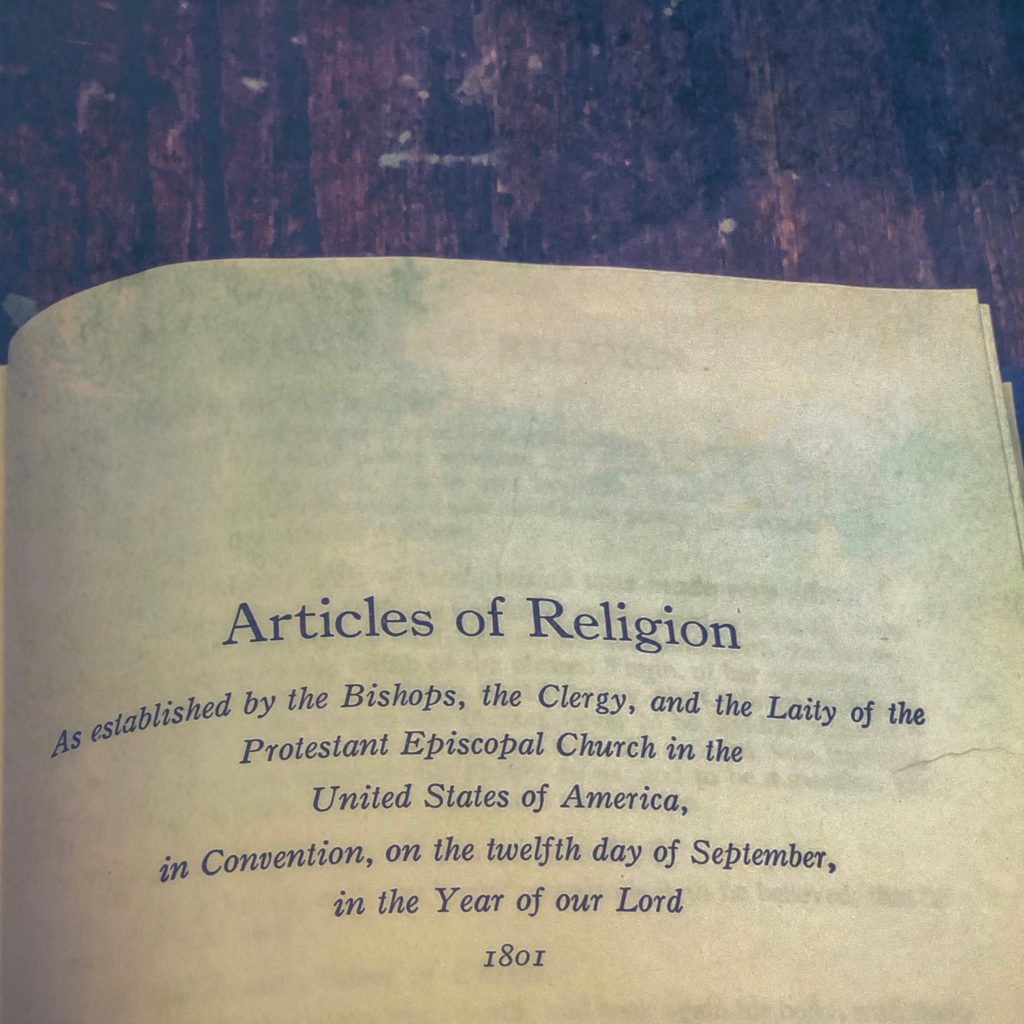
It is not lawful for any man to take upon him the office of public preaching, or ministering the Sacraments in the Congregation, before he be lawfully called, and sent to execute the same. And those we ought to judge lawfully called and sent, which be chosen and called to this work by men who have public authority given unto them in the Congregation, to call and send Ministers into the Lord’s vineyard.
by the Rev. Jordan Trumble
Someone once confided in me that they’d served on their diocesan Commission on Ministry for a brief period of time but resigned before the end of their term because they never quite felt comfortable taking part in a decision about who should or should not be ordained. As they explained their unease at the task of aiding others’ discernment, they wondered aloud, “Shouldn’t people just be allowed to follow whatever they think God is calling them to do?” This question is at the heart of Article XXIII and, for the writers of the Thirty-Nine Articles, the answer is a resounding “no.”
For Anglican Christians in the 16th Century, the immediate impetus for answering this question was a rising tide of radical Protestant reformers who believed their own sense of call was the only necessary qualification for ministry and that God’s call need not be discerned or regulated by anyone outside of themselves. Of course, the question of who may minister in the Church was not original to the writers of the Thirty-Nine Articles. It is a question that has been debated throughout the Church for centuries and is one that is still debated in the present day by people ranging from church professionals to my nonagenarian former parishioner who once observed to me, “I’m not so sure I like these churches that let anyone just stand up and be a pastor.”
Of those debating the subject in the 16th Century, Lutherans were the first to take a stand against the notion that one need only to sense God’s call in order to be qualified for ministry. Article XIV of the Augsburg Confession, written in 1530, reads, “…no one should publicly teach in the Church or administer the Sacraments unless he be regularly called,” with the phrase “regularly called” referring to a call that comes from those in positions of authority in the Church. In 1538, Cranmer drafted his own set of articles, the Thirteen Articles, which was modeled on the Augsburg Confession; this document was ostensibly written in preparation for talks with German Lutherans but was never officially adopted by the Church of England. In the Thirteen Articles, Cranmer not only echoed the sentiments expressing in the Augsburg Confession, but expanded upon its ideas; in Article X of the Thirteen Articles Cranmer wrote:
Concerning the ministers of the Church we teach that no-one ought to teach publicly or administer the sacraments unless lawfully called by those in the Church’s ministry. According to the word of God and the laws and customs of every region, they have the right to call and ordain. No-one called to the ministry, including the Roman or any other bishop, can claim for himself as by divine right, the power to teach publicly, to administer the sacraments, or exercise any ecclesiastical function in another diocese or parish. This applies to a bishop in another diocese and to a parish priest in another parish.
Cranmer agreed with the idea that those in ministry must be called “by those in the Church’s ministry” and he also contended that such a calling was not unqualified permission to minister whenever or wherever one chose but that the exercise of ministry was always subject to permission. Although this version of the Article was never officially adopted, we see this principle in practice in the Church to the present day: clergy must have permission to minister in a parish or diocese other than their own. Despite the fact that this principle continues to be applied to the exercise of ministry, though, the sentiments expressed in the second half of Cranmer’s Article had been excised by the time the Forty-Two Articles were written in 1553 and the current form of the Article was completed; it appeared as Article XXIV in the Forty-Two Articles before becoming Article XXIII in the Thirty-Nine Articles.
The Latin text of Article XXIII is particularly helpful in understanding what reformers were trying to accomplish in this article. The word translated in English as “congregation” is “ecclesia” in Latin, the same word used in Article XIX for the visible Church. The article is not speaking of ministry in a particular congregation but in the whole of the Church; anyone engaging in ministry anywhere in the Church must be called by those in authority. Furthermore, while the English version of the article uses the words “lawful” and “lawfully,” the Latin version uses the words “licet” which is more accurately translated as “permitted” and “legitime” which is more accurately translated as “legitimately.” Perhaps a more faithful wording would be, “It is not permitted for any man to take upon him the office of public preaching, or ministering the Sacraments in the Church, before he be legitimately called…” Article XXIII wasn’t attempting to appeal to the law of the land but rather sought to do what would be proper in the eyes of God. Of course, this line of thinking leads one directly back to the very question radical reformers were asking: scripture gives countless examples God directly calling people into various forms of ministry or service; why must the Church regulate God’s call?
Although Article XXIII can be very simply summarized by saying that a calling to ministry must come from those in positions of authority in the Church, the article also reiterates what ministry entails and explains how authority is defined. Article XXIII must be read in light of Article XIX, “Of the Church,” which begins, “The visible Church of Christ is a congregation of faithful men, in which the pure Word of God is preached, and the Sacraments be duly ministered according to Christ’s ordinance…” If Article XIX tells us what the visible Church is and what constitutes ministry in it, Article XXIII tells us who gets to exercise that ministry: those who are lawfully called and sent by those with public authority, a category defined by ordination. Article XIII does not deny that God has directly called people before and is still capable of doing so, but instead emphasizes the structures for ministry and ordination that God instituted in the Church, asserting that those called to ministry must have their calling recognized and affirmed by those whose calling has already been recognized and affirmed, a pattern that stretches back to the earliest days of Christianity. This pattern binds ministers to the Church through apostolic succession but also ensures some degree of accountability to minister within the accepted beliefs and practices of the Anglican tradition.
If Article XXIII is about the issue of authority in the Church, the issue of accountability to the Church and Her teachings is the other side of the same coin. Although it isn’t explicitly stated in the article, the pattern set forth in Article XXIII ensures, in some measure, that those being ordained actually believe the very things the Church teaches or are, at the very least, willing to subscribe to them. The Thirty-Nine Articles themselves are even the means by which people are held accountable to the doctrine of the Church: to this day, ordinands in the Church of England and some dioceses in other provinces take oaths of subscription to the articles. For several centuries, subscription to the articles was also a requirement for those holding office in England, where the Church of England is the established church. Yet even in parts of the Anglican tradition in which subscription to the Thirty-Nine Articles isn’t mandatory, accountability to Anglican doctrine isn’t forgotten but simply takes a different form, such as in the Episcopal Church where bishops, priests, and deacons, all promise these words during their ordinations: “I do solemnly engage to conform to the doctrine, discipline, and worship of The Episcopal Church.” In this way, accountability to authority and doctrine are woven into the very fabric of the Anglican tradition and cannot be divorced from our liturgical life. Yet the issue of accountability is also political: for those in the Church of England, especially at the time this article was written, the issue of accountability to the authorities of the church is paramount to keeping order in the realm.
Article XXIII is likely one of the least controversial articles, at least insofar as it establishes a pattern of calling ministers for the “Lord’s vineyard,” but it is impossible to read it in the context of the 21st Century Episcopal Church (USA) without noting that modern readers might perceive it as being saturated with clericalism. Episcopalians enjoy few things more than pointing out that the Catechism in the Book of Common Prayer 1979 defines the ministers of the Church as “lay persons, bishops, priests, and deacons” (855). Yet this idea that the laity are ministers is not reflected in Article XXIII; while the article does not specify orders of ministry, the underlying assumption of the text is that a calling to ministry goes hand in hand with ordination. That isn’t to say that the laity are not or cannot be ministers, but rather that our understanding of ministry has outgrown the 16th Century reformers’ conception of ministry. Even the ministries specifically mentioned in Article XXIII are no longer executed only by clergy; the ministry of the Table is reserved for those who are ordained but we have processes by which lay people may become licensed preachers and serve in congregations.
Although the Church, generally, and the Anglican tradition, specifically, have certainly evolved in many ways since Article XXIII was first written, including in the ways we define ministry, the original intent behind Article XXIII is as important as ever. Those in positions of ministry must be accountable to someone or something greater than one’s own internal sense of call. The practice of calling and ordaining ministers by those with authority in the Church, therefore, continually binds us to one another and to those who have gone before us and those who will come after us, not only by the laying on of hands but through the beliefs we preach and teach and the Bread we break together. The practice of calling and ordaining ministers by those in authority reminds us that the Church is greater than any individual’s ideas and whims and that ministry in the Church is a relationship based on trust and accountability, to God, to Tradition, and to the community.
The Rev. Jordan Trumble is Priest-in-Charge of Christ Church, Fairmont, in the Diocese of West Virginia where she is also active in summer camp ministry. In her free time, she evangelizes for Appalachia and serves as a contributing editor at Episcopal Café.
